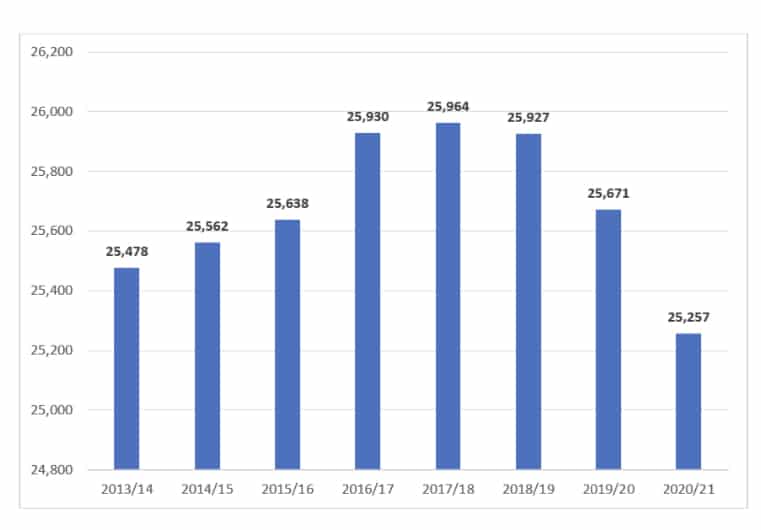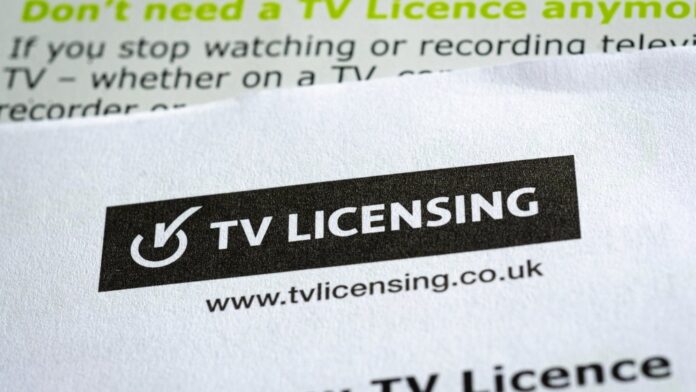This briefing provides a summary of the government’s recent proposals for the licence fee, assesses its motivations and consequences, and identifies some potential action points. Our analysis draws on our recent evidence and proposals from two Media Reform Coalition reports published in late 2021:
The Media Influence Matrix report, exploring the impact of shifts in policy, funding and technology on contemporary journalism in the UK
The Manifesto for a People’s Media, published as part of the ‘BBC and Beyond’ project, outlining proposals for a more democratic, independent and accountable media.
The settlement: The government’s announcement for BBC funding covers the six-year period from 1 April 2022 to 31 March 2028. The level of the licence fee will be frozen for the two years 2022/23 and 2023/24 at £159 before rising in line with inflation for the four years from 1 April 2024 to 31 March 2028.
The size of the BBC’s real-terms funding shortfall will depend on two factors: (1) the rate of inflation between 2022-24 and (2) whether TV licence sales rise or fall. After growing for decades, TV licence sales have begun to decline in recent years and in 2020/21 stood at 25,257,000, 2.7% below their peak in 2017/18. TV Licensing believes this is due to a rise in evasion, which has become easier as TV viewing moves online and both aerials and TV sets become unnecessary to watch live TV and catch-up TV.
TV licence sales volumes (‘000s of licences including free over-75s licences)
Source: Television Licence Free Trust Statement for the Year Ending 31 March 2021

CPI inflation rose by 4.8% in the year to December 2021, according to the ONS.[3] The annual rate is now the highest it has been since 2008, meaning that the year-on-year effect of the freeze will be far more damaging than the freeze from 2010/11 to 2016/17.
The effect of the two-year freeze is therefore likely to be a substantial shortfall in BBC funding, which will be exacerbated if TV licence sales continue to fall. According to Enders Analysis, as of 2020, the BBC’s income had fallen 30% in real terms since 2010. They estimate that by 2027, given further below-inflation licence fee increases, the BBC’s income will be 34% lower, some £1.4 billion per year, in real terms than in 2010.[4]
Any cuts in provision as a result of the freeze is likely to be felt disproportionately by the poorest parts of the population. Some 8 million adults watch only free-to-air TV, 4 million of whom are in the C2DE demographic, and are therefore reliant on services like the BBC. As Enders Analysis recently concluded: ‘It is these people who will be hardest hit by real-terms licence fee cuts’.[5]
Nadine Dorries has said the freeze is justified by the need to protect households from the consequences of a licence fee rise: “The global cost of living is rising, and this Government are committed to supporting families as much as possible during these difficult times. Given that climate, we had to think very carefully about imposing any potential increase in the TV licence fee, particularly when any increase would expose families to the threat of bailiffs knocking on their door or criminal prosecution. When it comes to monthly bills, this is one of the few direct levers we have in our control as a Government. In the end, we simply could not justify putting extra pressure on the wallets of hard-working households.”
Lucy Powell challenged Dorries on the grounds that the licence fee is a small household cost compared to other soaring living costs about which the government is doing very little: “What is it about the £13.57 a month that marks it out for such immediate and special attention to address the cost of living, over the £1,200-a-year increase in energy and household bills or the £3,000-a- year tax increases that the Culture Secretary’s Government have imposed? Is the licence fee really at the heart of the cost-of-living crisis, or is this really about the Government’s long-standing vendetta against the BBC?”
Dorries claimed particular concern for families exposed “to the threat of bailiffs knocking on their door or criminal prosecution”. If the government is genuinely concerned about the harm to family budgets of annual rises of up to £8 in the cost of the licence fee, then:
Why has it done so little elsewhere in government policy to address the cost of living crisis or the 14.5 million people – 1 in 5 – who are in poverty?
Why has the government removed the £20 uplift to Universal Credit, an estimated cut of £1,000 a year to the incomes of 4.4 million of the poorest households in the UK?
Why not impose new taxes on the well-off to raise the £320m necessary to give free TV licences to the 2 million poorest households in the UK?
It is important to note that criminal prosecution:
- is only used as a last resort by TV Licensing in cases of repeated failure to pay.
- does not leave a criminal record that shows up in DBS checks.
- only results in a fine. In imposing the fine, magistrates are required to take into account ability to pay. Failure to pay the fine can result in measures being taken to recover the fine, but this is the same as with e.g. unpaid council tax, or indeed unpaid utility, phone or other household bills.
Contrary to the impression some right-wing newspapers and MPs have given, TV licensing is not enforced by uniquely draconian methods, but by entirely normal mechanisms.
Elsewhere in her Commons statement, Nadine Dorries said, “In the last few months, I have made it clear that the BBC needs to address issues around impartiality and groupthink.” Last October the Sunday Times reported that she had told allies: “Nick Robinson has cost the BBC a lot of money” by cutting off Boris Johnson during a Today programme interview. (She later denied having said this in evidence to the Commons DCMS Select Committee.) The impression is that the Secretary of State is quite prepared to link BBC funding to how favourably she perceives the BBC to be covering the government. This is a blatant attack on the BBC’s political independence and yet an unsurprising one. So long as the government of the day has it within its power to periodically set the level of the licence fee and thereby influence the BBC’s single largest source of funding, ministers will face the temptation to use their power over funding to pressure the BBC.
The only way to end this is to change the way the BBC is funded. Either by:
1.Establishing an independent commission to periodically review and determine the level of licence fee funding, or
2.Replacing the licence fee with a new funding mechanism which guarantees the BBC a rising income and does not require periodic new settlements, or
3.Both 1 and 2: a new funding mechanism, with the level of funding periodically reviewed and set by an independent commission free of government control.
The process by which the Press Recognition Panel was appointed is an obvious model for an appointments process free of government interference.
Sources close to Nadine Dorries told the Mail on Sunday that she intended to have abolished the licence fee altogether by the time the current licence fee settlement expires at the end of 2026. However, in her Commons statement she rowed back on this. According to the Financial Times this was because there was opposition within the Cabinet, on the grounds that there had not been a proper discussion on whether the licence fee should be replaced.
Key Points and Actions
What can we do to oppose these cuts to the BBC’s funding?
Launch a petition declaring the public’s willingness to pay for public service broadcasting and to introduce funding measures that will avoid cuts to the BBC. In the short term, even a 5% rise in the price of the licence fee would only translate as an extra £7.95 a year, or an extra 63p per month. A petition is the ideal way to highlight this fact in a ‘viral’ way.
Commission polling that compares support for a flat tax versus a progressive form of funding in order to take on board legitimate grievances about the shortcomings of the existing licence fee.
Point out that relief for the poorest households paying for the TV licence could easily be organised: free licences for two million of the poorest households in the UK would cost £320m, equivalent to a range of small tax rises on the wealthiest UK households.
Point out that cutting the BBC’s funding harms households across the UK, especially the poorest, in a different way: by forcing the BBC to make further cuts to its programmes and services. Many households cannot afford to subscribe to Netflix (£120 a year for the standard package), Amazon Prime Video (£96 a year), Sky (£312 a year or £492 with Sky Sports), The Times (£312 a year for a digital subscription) or The Telegraph (£156 a year). These households, as we have already argued above, depend on the BBC across TV, radio and online.
Launch an Early Day Motion calling on the government to explore longer-term and fairer alternatives, such as a Household Levy (as in Germany) or an independently administered public service fee (as in Sweden) to the television licence fee, that maintain universalism as a fundamental principle of paying for genuinely independent public service media content.
This briefing is provided as part of the UK component of the Media Influence Matrix, set up to investigate the influence of shifts in policy, funding, and technology on contemporary journalism, funded by the Joseph Rowntree Charitable Trust. The final report was published in December 2021.
Sources:
HC Deb (17 January 2022) vol. 707 col. 39-40, available at: https://hansard.parliament.uk/commons/2022-01-17/debates/7E590668-43C9- 43D8-9C49-9D29B8530977/BBCFunding#
Caroline Wheeler and Rosamund Unwin, “Will BBC pay the price for upsetting Boris Johnson?” The Sunday Times 24 October 2021, available at: https://www.thetimes.co.uk/article/will-bbc-pay-the-price-for-upsetting-boris-johnson-97zdzldpr
Andrew Sparrow, “Dorries denies threatening to cut BBC funding because of Nick Robinson’s interview with PM – as it happened” The Guardian 23 November 2021, available at: https://www.theguardian.com/politics/live/2021/nov/23/social-care-costs-jeremy-hunt-boris- johnson-sajid-javid-covid-uk-politics-live-latest-updates
The same process could also in future be used to appoint the BBC’s board. This was suggested by David Normington, the former Commissioner for Public Appointments, in an appendix to the 2016 Puttnam report.
See A Future for Public Service Television: Content and Platforms in a Digital World, p. 161-2, available at: https://futureoftv.org.uk/report/
Peter Foster, George Parker and Laura Hughes, “Cabinet opposition forced climbdown on ending BBC licence fee” Financial Times 19 January 2022, available at: https://www.ft.com/content/6c7f9bfa-617e-47b2-a45a-a1038c76d20d
HC Deb (17 January 2022) vol. 707 col. 39, available at: https://hansard.parliament.uk/commons/2022-01-17/debates/7E590668-43C9- 43D8-9C49-9D29B8530977/BBCFunding#
HC Deb (17 January 2022) vol. 707 col. 41, available at: https://hansard.parliament.uk/commons/2022-01-17/debates/7E590668-43C9- 43D8-9C49-9D29B8530977/BBCFunding#
Joseph Rowntree Foundation, UK Poverty 2022, p. 10, available at: https://www.jrf.org.uk/report/uk-poverty-2022
BBC News, “Universal credit: What is the taper rate?” 27 October 202, available at: https://www.bbc.co.uk/news/uk-41487126
Office for National Statistics, “Consumer price inflation, UK: December 2021”, available at
https://www.ons.gov.uk/economy/inflationandpriceindices/bulletins/consumerpriceinflation/december2021
Enders Analysis, ‘BBC licence fee settlement: A diminished TV ecology’, 10 September 2021, available at
https://www.endersanalysis.com/reports/bbc-licence-fee-settlement-diminished-tv-ecology
Enders Analysis, ‘Public service television: something for everyone’, 17 January 2022, available at
https://www.endersanalysis.com/reports/public-service-television-something-everyone
If you like our content please keep us going for as little as £2 a month https://dorseteye.com/donate/







